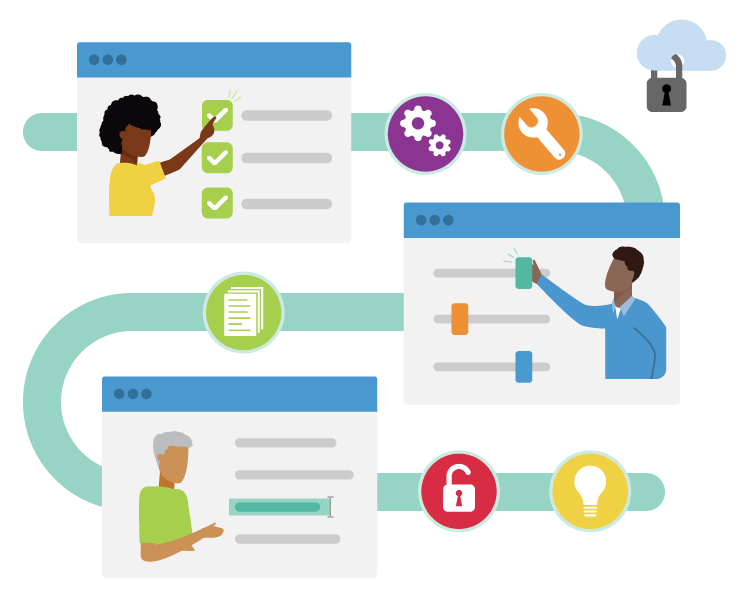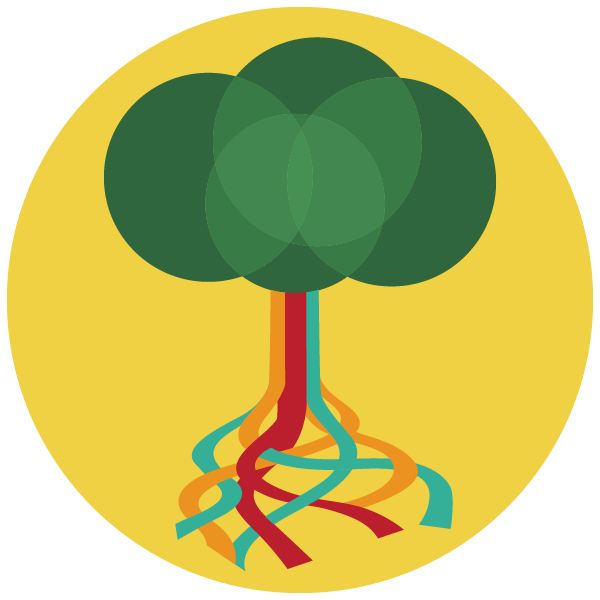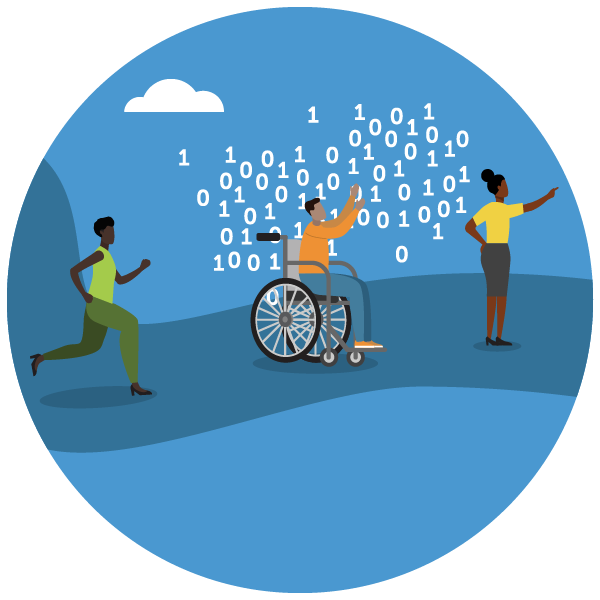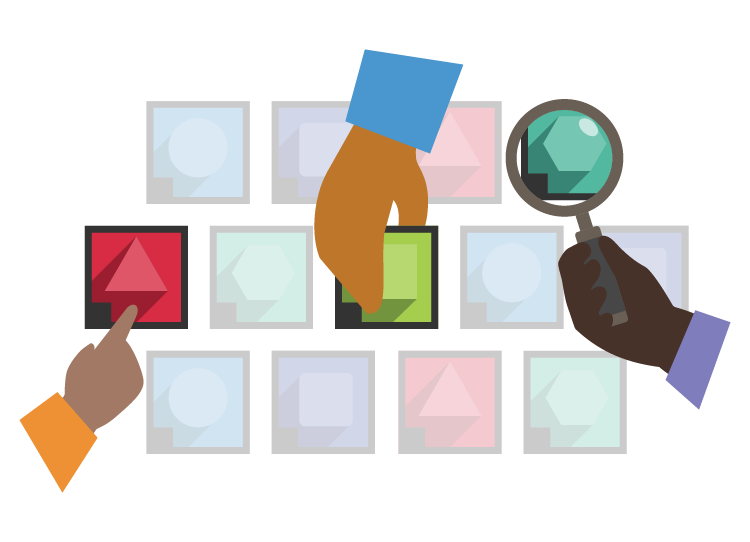
By 2031, Digital Promise is working toward ensuring 30 million historically and systematically excluded learners are enabled to achieve postsecondary credentials that offer economic security, well-being, and agency. See how Digital Promise has been tapping into the power of credentialing, research, and Inclusive Innovation in supporting learners.
 The future of credentialing is digital. The Adult Learning team is expanding efforts to identify and promote digital literacy skills and supports—foundational and/or occupational—among historically and systematically excluded adult learners. Over the last year, we produced research exploring the use of micro-credentials on the social mobility of rural learners, prioritizing those impacted by poverty, particularly Black, Latino, and Indigenous populations. We found that micro-credentials can (and sometimes do) lead to job promotions, higher wages, and an increase in self-confidence for rural learners. As we continue moving toward a skills-based future of learning and work, we are committed to exploring the factors, skills, and supports that workers need to successfully pursue postsecondary credentials, especially non-degree credentials through the lens of racial equity.
The future of credentialing is digital. The Adult Learning team is expanding efforts to identify and promote digital literacy skills and supports—foundational and/or occupational—among historically and systematically excluded adult learners. Over the last year, we produced research exploring the use of micro-credentials on the social mobility of rural learners, prioritizing those impacted by poverty, particularly Black, Latino, and Indigenous populations. We found that micro-credentials can (and sometimes do) lead to job promotions, higher wages, and an increase in self-confidence for rural learners. As we continue moving toward a skills-based future of learning and work, we are committed to exploring the factors, skills, and supports that workers need to successfully pursue postsecondary credentials, especially non-degree credentials through the lens of racial equity.
 The Center for Inclusive Innovation reimagines education research and development (R&D) by resourcing the creative ingenuity of communities to create powerful learning opportunities for students furthest from opportunity, including students who are Black, Brown, and Indigenous, experiencing poverty, multilingual learners, and/or experiencing learning differences. The Inclusive Innovation model amplifies voices that have been underrepresented in education innovation to solve education challenges in partnership with school districts, families, and community partners. Through this work, students are increasing student voice and choice in their curriculum by redesigning social studies curriculum and writing assignments; building digital tools to showcase student voice, facilitate peer feedback, and promote civic engagement around topics relevant to students; increasing student agency and addressing authentic challenges that are personally meaningful for them through developing and leading professional development for educators on mental health and racial trauma, racial equity, and social justice; and leading advisories, design sessions, and feedback loops with partners in their community.
The Center for Inclusive Innovation reimagines education research and development (R&D) by resourcing the creative ingenuity of communities to create powerful learning opportunities for students furthest from opportunity, including students who are Black, Brown, and Indigenous, experiencing poverty, multilingual learners, and/or experiencing learning differences. The Inclusive Innovation model amplifies voices that have been underrepresented in education innovation to solve education challenges in partnership with school districts, families, and community partners. Through this work, students are increasing student voice and choice in their curriculum by redesigning social studies curriculum and writing assignments; building digital tools to showcase student voice, facilitate peer feedback, and promote civic engagement around topics relevant to students; increasing student agency and addressing authentic challenges that are personally meaningful for them through developing and leading professional development for educators on mental health and racial trauma, racial equity, and social justice; and leading advisories, design sessions, and feedback loops with partners in their community.
 Introductory courses in postsecondary education function as gateways for degree attainment, especially for historically and systematically excluded students. The Learning Sciences Research Center of Excellence has been addressing this issue through a research-practice partnership with five, mostly minority-serving, institutions of higher education. The partnership has provided professional learning and research support to faculty-centered project teams working to redesign high-enrollment introductory courses, many of which continue to be offered online even after the abrupt transition to remote learning during the onset of the COVID-19 pandemic. Implementing research-based teaching practices focused on equity and digital learning and informed by student feedback, the college teams have redesigned 14 introductory courses to achieve more equitable outcomes for historically and systematically excluded students.
Introductory courses in postsecondary education function as gateways for degree attainment, especially for historically and systematically excluded students. The Learning Sciences Research Center of Excellence has been addressing this issue through a research-practice partnership with five, mostly minority-serving, institutions of higher education. The partnership has provided professional learning and research support to faculty-centered project teams working to redesign high-enrollment introductory courses, many of which continue to be offered online even after the abrupt transition to remote learning during the onset of the COVID-19 pandemic. Implementing research-based teaching practices focused on equity and digital learning and informed by student feedback, the college teams have redesigned 14 introductory courses to achieve more equitable outcomes for historically and systematically excluded students.
 The Micro-credentials Platform has multiple offerings designed to help educators better support their students on their postsecondary journeys, including College Access Coaching and Advising for Digitally Enabled Careers.
The Micro-credentials Platform has multiple offerings designed to help educators better support their students on their postsecondary journeys, including College Access Coaching and Advising for Digitally Enabled Careers.
In 2021, we hosted more than 550 active micro-credentials on our platform. With a catalog representing more than 50 issuing organizations, more than 8,000 new learners joined our platform to pursue their professional goals. In this year alone, almost 5,000 educators were awarded micro-credentials. Micro-credentials continued to offer educators flexible, virtual avenues to earn recognition for the many ways they have grown their instructional practice.
As we look to the future, the Micro-credentials team is exploring workforce development opportunities in partnership with the Adult Learning and Learning Employment Innovations teams.